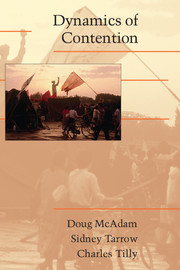
-
Select format
-
- Publisher:
- Cambridge University Press
- Publication date:
- June 2012
- September 2001
- ISBN:
- 9780511805431
- 9780521805889
- 9780521011877
- Dimensions:
- (228 x 152 mm)
- Weight & Pages:
- 0.77kg, 410 Pages
- Dimensions:
- (228 x 152 mm)
- Weight & Pages:
- 0.55kg, 412 Pages
- Subjects:
- Politics: General Interest, Sociology: General Interest, Political Sociology, Politics and International Relations, Sociology
You may already have access via personal or institutional login- Subjects:
- Politics: General Interest, Sociology: General Interest, Political Sociology, Politics and International Relations, Sociology
Book description
In recent decades the study of social movements, revolution, democratization and other non-routine politics has flourished. And yet research on the topic remains highly fragmented, reflecting the influence of at least three traditional divisions. The first of these reflects the view that various forms of contention are distinct and should be studied independent of others. Separate literatures have developed around the study of social movements, revolutions and industrial conflict. A second approach to the study of political contention denies the possibility of general theory in deference to a grounding in the temporal and spatial particulars of any given episode of contention. The study of contentious politics are left to 'area specialists' and/or historians with a thorough knowledge of the time and place in question. Finally, overlaid on these two divisions are stylized theoretical traditions - structuralist, culturalist, and rationalist - that have developed largely in isolation from one another. This book was first published in 2001.
Reviews
‘Dynamics of Contention - written by three of the leading scholars of social movements and ‘contentious politics’ - is undoubtedly the most ambitious, and arguably the most important, book on social movements (and related phenomena) written in the past two decades.’
Source: Sociology
Contents
Metrics
Full text views
Full text views help Loading metrics...
Loading metrics...
* Views captured on Cambridge Core between #date#. This data will be updated every 24 hours.
Usage data cannot currently be displayed.
Accessibility standard: Unknown
Why this information is here
This section outlines the accessibility features of this content - including support for screen readers, full keyboard navigation and high-contrast display options. This may not be relevant for you.
Accessibility Information
Accessibility compliance for the PDF of this book is currently unknown and may be updated in the future.


